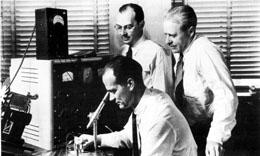On November 1, 1956, Dr. Walter Brattain (1902-1987) is named as co-winner of the Nobel Prize for Physics for inventing the transistor. He shares the $38,637 prize with John Bardeen and William Shockley, with whom he worked at Bell Telephone Laboratories in Murray Hill, New Jersey. Bell Labs introduced the transistor into commercial use in 1953 and the device revolutionized electronics by replacing the vacuum tube with a smaller, cheaper, and more reliable means of amplifying electric signals. Brattain grew up in Tonasket, Okanogan County.
Walter Houser Brattain was born in China in 1902 where his father was a teacher in a Chinese boys' school. In 1913, the family moved to a farm near Tonasket. In the 1920s, the elder Brattain purchased the Tonasket Flour Mill and moved to town. Because Tonasket High School was not accredited, Walter attended his senior year on Bainbridge Island. Brattain then attended Whitman College in Walla Walla and graduated in 1924. He took a master's degree from the University of Oregon and worked his way to Minneapolis on a trainload of sheep. There he got a doctorate from the University of Minnesota.
Brattain worked at the National Bureau of Standards before joining the Bell Labs in 1929. During World War II, he researched anti-submarine technology at Columbia University. He began working with semiconductors in 1939. With Bardeen and Shockley, Brattain studied the properties of solids and semiconductors and discovered the transistor effect. They demonstrated the first transistor on December 23, 1947, and it served as the basis for other improvements before commercial release in 1953. In 1954, the transistor was the basis for a Japanese Regency pocket radio, which sold for $49.95 (almost $350 in 2005) and was immensely popular.
The three inventors were awarded the prize on December 10, 1956, in Stockholm, Sweden. On the 25th anniversary of the invention, Brattain said: "The thing I deplore most is the use of solid-state electronics by rock-and-roll musicians to raise the level of sound to where it is both painful and injurious" (The New York Times).
Walter Brattain retired to Seattle and died there in 1987.

